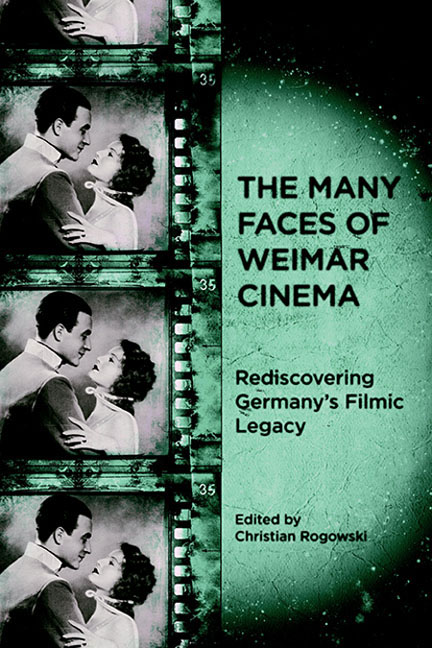Book contents
- Frontmatter
- Contents
- List of Illustrations
- Preface
- Introduction: Images and Imaginaries
- 1 Richard Oswald and the Social Hygiene Film: Promoting Public Health or Promiscuity?
- 2 Unsettling Nerves: Investigating War Trauma in Robert Reinert's Nerven (1919)
- 3 Humanity Unleashed: Anti-Bolshevism as Popular Culture in Early Weimar Cinema
- 4 Desire versus Despotism: The Politics of Sumurun (1920), Ernst Lubitsch's “Oriental” Fantasy
- 5 Romeo with Sidelocks: Jewish-Gentile Romance in E. A. Dupont's Das alte Gesetz (1923) and Other Early Weimar Assimilation Films
- 6 “These Hands Are Not My Hands”: War Trauma and Masculinity in Crisis in Robert Wiene's Orlacs Hände (1924)
- 7 The Star System in Weimar Cinema
- 8 Schaulust: Sexuality and Trauma in Conrad Veidt's Masculine Masquerades
- 9 The Musical Promise of Abstract Film
- 10 The International Project of National(ist) Film: Franz Osten in India
- 11 The Body in Time: Wilhelm Prager's Wege zu Kraft und Schönheit (1925)
- 12 Henrik Galeen's Alraune (1927): The Vamp and The Root of Horror
- 13 The Dialectic of (Sexual) Enlightenment: Wilhelm Dieterle's Geschlecht in Fesseln (1928)
- 14 Babel's Business — On Ufa's Multiple Language Film Versions, 1929–1933
- 15 “A New Era of Peace and Understanding”: The Integration of Sound Film into German Popular Cinema, 1929–1932
- 16 Landscapes of Death: Space and the Mobilization Genre in G. W. Pabst's Westfront 1918 (1930)
- 17 Undermining Babel: Victor Trivas's Niemandsland (1931)
- 18 Unmasking Brigitte Helm and Marlene Dietrich: The Vamp in German Romantic Comedies (1930–33)
- Filmography
- Notes on the Contributors
- Index
16 - Landscapes of Death: Space and the Mobilization Genre in G. W. Pabst's Westfront 1918 (1930)
Published online by Cambridge University Press: 29 April 2017
- Frontmatter
- Contents
- List of Illustrations
- Preface
- Introduction: Images and Imaginaries
- 1 Richard Oswald and the Social Hygiene Film: Promoting Public Health or Promiscuity?
- 2 Unsettling Nerves: Investigating War Trauma in Robert Reinert's Nerven (1919)
- 3 Humanity Unleashed: Anti-Bolshevism as Popular Culture in Early Weimar Cinema
- 4 Desire versus Despotism: The Politics of Sumurun (1920), Ernst Lubitsch's “Oriental” Fantasy
- 5 Romeo with Sidelocks: Jewish-Gentile Romance in E. A. Dupont's Das alte Gesetz (1923) and Other Early Weimar Assimilation Films
- 6 “These Hands Are Not My Hands”: War Trauma and Masculinity in Crisis in Robert Wiene's Orlacs Hände (1924)
- 7 The Star System in Weimar Cinema
- 8 Schaulust: Sexuality and Trauma in Conrad Veidt's Masculine Masquerades
- 9 The Musical Promise of Abstract Film
- 10 The International Project of National(ist) Film: Franz Osten in India
- 11 The Body in Time: Wilhelm Prager's Wege zu Kraft und Schönheit (1925)
- 12 Henrik Galeen's Alraune (1927): The Vamp and The Root of Horror
- 13 The Dialectic of (Sexual) Enlightenment: Wilhelm Dieterle's Geschlecht in Fesseln (1928)
- 14 Babel's Business — On Ufa's Multiple Language Film Versions, 1929–1933
- 15 “A New Era of Peace and Understanding”: The Integration of Sound Film into German Popular Cinema, 1929–1932
- 16 Landscapes of Death: Space and the Mobilization Genre in G. W. Pabst's Westfront 1918 (1930)
- 17 Undermining Babel: Victor Trivas's Niemandsland (1931)
- 18 Unmasking Brigitte Helm and Marlene Dietrich: The Vamp in German Romantic Comedies (1930–33)
- Filmography
- Notes on the Contributors
- Index
Summary
When G. W. Pabst's anti-war film, Westfront 1918, premiered in 1930, it was greeted with extravagant praise. Der Kinematograph, Germany's oldest weekly film journal, devoted its entire front page to an article on it, emphasizing the link between the film's importance and its authenticity: the reviewer noted the location shooting and the fact that three of the film's lead actors had actually served in the military during the war (the fourth, the actor playing “der Student,” was still a child when the Versailles peace treaty was signed). Another reviewer, Hans Wollenberg in LichtBild Bühne, likewise praises the film's ostensible realism, while adding a note of unabashedly nationalist rhetoric: the film's quality, he claims, constitutes a “victory for the independent German film producer in the international competition for quality products.” Such martial posturing was a political position that would come to be lamented by many at the time (viz. “Westfront 1918” from the Kreuz-Zeitung). But Wollenberg's reaction also underscores how the film was, upon the very first viewings, already well woven into national and transnational contexts. Not only was Wollenberg prepared to cheerfully declare the film a German watershed, but he also immediately claimed a place for it in global culture, both film culture and economies around the world.
Wollenberg's response to the film resonates, in this way, with the ideas of Stephan Schindler and Lutz Koepnick, who have recently exhorted German film studies to move toward the transnational and cosmopolitan (Schindler/Koepnick, 3–4). Their exhortation to probe the limits of the national with the transnational aligns with important theoretical developments in thinking about and through space in culture. Many authors have remarked on a recent “spatial turn” in German cultural studies, one that underscores how cultural production is always situated in the world, always presumes and builds on some imagination of place and space, especially a place of the self in a dynamically mapped world. Spatial turns in theory and culture have been recently associated with the works of French and Anglophone theorists Henri Lefebvre, David Harvey, Doreen Massey, and Edward W. Soja as well as with the US cultural critic Fredric Jameson and the Italian literary scholar Franco Moretti. But these theorists of space are often, and quite openly, indebted to the important tradition of spatial and urban studies in German culture, including especially the work of Walter Benjamin and Siegfried Kracauer.
- Type
- Chapter
- Information
- The Many Faces of Weimar CinemaRediscovering Germany's Filmic Legacy, pp. 268 - 285Publisher: Boydell & BrewerPrint publication year: 2010



